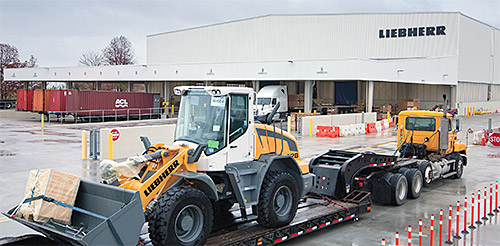Liebherr: Arming the Workforce With New Skills
Liebherr manufactures large trucks for the mining industry, including the world’s largest diesel-electric mining truck. These gigantic machines are partly assembled, tested, and certified at the plant in Newport News with complete assembly carried out at the mine. One hundred percent of the vehicles produced in Newport News are exported. Liebherr USA, Co. headquarters and three of its eight divisions are also based in Newport News.
Q4 2019

Virginia Economic Review: What trends do you see emerging from a manufacturing perspective? What’s changing and how will the landscape look in the next five to 10 years?
Cort Reiser: As we’ve entered into the fourth generation of the Industrial Revolution, our workforce needs to be more skilled. We invest a lot to train our workforce, and we work with the local educational institutions to find and develop talent from K-12, to high schools, community colleges, and local universities.
VER: How is this fourth generation, or Industry 4.0, changing the way your sector manufactures?
Reiser: Things are changing rapidly. As machines begin to talk to us and each other, we have to understand what that means for manufacturing and find new applications for such technology. Automation means we don’t have to stand and watch the work be completed; instead we are notified when it is done.
Even better, automation can provide preventative maintenance information, predicting an issue before it occurs. These shifts in the process allow more time for quality-checking and employee growth so that we are able to develop a more highly functioning team.
Now we can adapt our focus to more upper-level tasks. Somebody has to program the automated machines, and who better than a person who’s done the job by hand? So, we’re taking our existing workforce and arming them with new knowledge and skills, training them to train the next wave of manufacturing technology. Nobody is obsolete, nobody is laid off. Instead, our people stay on to help improve the process and final product, by teaching the machine the best possible way to do the work.
We will never replace our human workforce with robots. We’re a long way from that, as a company and as a society. We still need that human touch, the attention to detail, the experience, knowledge, and foresight, which only a human can contribute.
VER: What do you think states and regions can do to better position themselves to retain and attract manufacturing investments in the future? Reiser: Newport News and the area here is very attractive due to The Port. Importing and exporting from all around the world is happening just a few miles from our manufacturing facility, which puts us in a unique position. Liebherr — and other states and regions — looking to achieve these goals should invest in the smaller tiers of their supply chains, as well as acquiring a skilled workforce.
VER: So, you recommend recruiting smaller supply chain tiers, and hiring skilled employees?
Reiser: Not only recruiting them, but developing them, too. Some may not have the resources needed to achieve the best results. When a bigger company assists with training, the smaller companies benefit — and so do we. We all work from a supply chain, and it works better when we all collaborate.
Project Announcements
Akston Establishes Caddo Parish, Louisiana, Manufacturing Operations
03/02/2026
US Forged Rings Plans Hertford County, North Carolina, Steel Component Operations
03/02/2026
South Korea-Based Hanjung America Plans Huntington, Indiana, Manufacturing Operations
03/02/2026
Faith Technologies Plans Opelika, Alabama, Manufacturing Operations
03/01/2026
TaylorMade Golf Expands Vanderburgh County, Indiana, Distribution Operations
03/01/2026
Sediver USA Expands West Memphis, Arkansas, Operations
03/01/2026
Most Read
-
Top States for Doing Business in 2024: A Continued Legacy of Excellence
Q3 2024
-
Speed Built In—The Real Differentiator for 2026 Site Selection Projects
Q1 2026
-
Preparing for the Next USMCA Shake-Up
Q4 2025
-
The New Industrial Revolution in Biotech
Q4 2025
-
Strategic Industries at the Crossroads: Defense, Aerospace, and Maritime Enter 2026
Q1 2026
-
The Skilled Trades Are Ready for a Digital Future
Q4 2025
-
Amazon’s First Mass Timber Delivery Station Tests the Future of Low-Carbon Logistics
Q4 2025